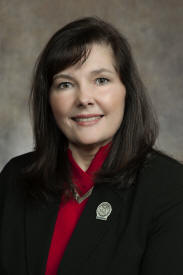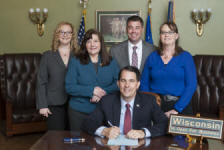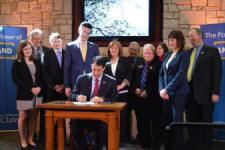News from Nancy!

Hello Everyone!
I hope you are
all doing well!
In this E-update I will be talking about
some of the bill signings that taken place since the last update.
Also, now that the legislative session has come to a close
I want to
share with you legislation I authored as well as other legislation
specifically crafted to protect Wisconsin seniors. I will be updating you on
other areas over the next couple updates.
In addition,
I want to remind you that a date has been set for
the Little Plover Rover Study/Optimization Model Presentation. I have
provided more details below.
VanderMeer Legislation Signed
into Law

Another VanderMeer/Lassa Bill Signed
into Law
Governor
Walker signed into law Assembly Bill 351, authored by Senator Julie
Lassa (D-Stevens Point) and myself. This is the fourth bi-partisan piece of
legislation we have co-authored, and the third to be passed through both
houses of the legislature. This bill will assist non-custodial parents who
are unemployed or underemployed obtain jobs. It provides a pathway for
training and future employability for those supporting parents and will help
develop our workforce. It was a pleasure to have worked with Senator Lassa
in bringing this legislation forward.

College
Affordability Legislation Signed into Law
Assembly Bill 744 is part of the
College Affordability Package to reduce student loan debt and increase the
success of college students. I am proud to be a co-author legislation
to require all higher education institutions to send students an annual
letter with information regarding educational costs and financial literacy
so students and families can make better decisions about their financial
future. This legislation will help students plan and evaluate their
investment into their professional future through their education.
Increasing
Mental Health in Schools
This week, Governor Walker signed into law
Assembly Bill 664 (AB664). This legislation permits licensed treatment
professionals, which include qualified treatment trainees, to provide mental
health services in schools without establishing a branch office in the
school. The change will reduce administrative burden and costs for mental
health therapists who are often paid less than costs for the critical care
that they provide students.
This is done by allowing licensed treatment
professionals offering outpatient mental health services at school to
receive Medical Assistance (MA) reimbursement, to the extent federal law
allows such reimbursement, regardless of whether the school site is
designated as a clinic office.
The goal is to make it easier for mental health professionals to provide the
critical care needed for some of our students. Reducing red tape will make
it easier for mental health professionals to provide services in schools.
When mental health therapy is available at school, students are more likely
to access treatment and miss less class time than when they have to travel
to an off-site clinic.
Focusing Seniors
As your elected official in the Assembly, I
ran for office with the purpose of making our state a better place for all
our residents, and as the 2015-16 legislative session comes to a close, I
wanted to share with you legislation I authored as well as other legislation
specifically crafted to protect Wisconsin seniors.
Protection Against Consumer Scams:
It is a sad reality that seniors and the disabled are frequently targeted
for consumer scams. I am proud to have authored Assembly Bill 610 to help
address this problem by allowing courts to impose a more fitting penalty for
these crimes. This bill was passed with overwhelming bipartisan support and
will help shield Wisconsin’s most vulnerable citizens.
SeniorCare Funding Maintained:
Many of you were concerned with the proposed changes to SeniorCare, a
valuable and popular program that can assist those age 65 or older in
receiving potentially lifesaving prescription medication. After hearing your
concerns, I sent a letter to the co-chair of the legislature’s Joint Finance
Committee reaffirming my support for this vital program and requested it be
preserved. In sharing many of your personal stories and concerns with the
proposal, I’m pleased to have played a role in saving SeniorCare.
Holding
the Line on Taxes:
This session my colleagues and I demonstrated our commitment to taxpayers by
creating no increases at the state level to the property, income, or sales
tax. We were able to accomplish this all while balancing our state budget
and maintaining the largest rainy day fund in Wisconsin history. I believe
it’s important for government to live within its means, and it’s my hope
that these prudent financial decisions will make it easier for you to manage
and balance your own budgets at home.
Focus on Alzheimer’s and Dementia:
Over 115,000 Wisconsinites currently live
with some form of dementia, and that number is projected to double over the
next 25 years. Many of those living with this disease are over the age of 65
with their primary caregiver being a spouse or adult child. Because of this,
my colleagues and I in the Assembly have passed 10 bills aimed at helping
those living with dementia and their caregivers. We approved an additional
$1 million in funding for respite care services, added new Dementia Care
Specialists in local Aging and Disability Resource Centers, increased
funding for Alzheimer’s research, and approved $250,000 to train mobile
crisis teams to be dementia capable. These bills serve as an important step
forward to better help those living with dementia and their caregivers.
I’m proud of the many things we accomplished this past legislative session,
and I look forward to achieving even more in the future.
Little Plover River Study
Presentation
Nearly two years ago, the Department of
Natural Resources (DNR), in collaboration with the Wisconsin Geological and
Natural History Survey, hosted a public meeting relating to groundwater and
its relationship to surface water. The meeting focused on the optimization
study and subsequent analysis of the Little Plover River watershed.
The Little Plover River study has recently been completed, therefore I
joined a group of bipartisan legislators to request the DNR to schedule a
follow-up meeting in the Central Sands region to present their findings as
well as answer questions from our constituents.
I want to inform you a date has been set for the Little Plover
Rover Study/Optimization Model Presentation. The presentation
will be given by the DNR and the Wisconsin Geological and Natural History
Survey on Tuesday, April 12th from 6:00-8:00 at Michelsen Hall in Noel Fine
Center at UW-Stevens Point. The address is as follows:
Noel Fine Arts Center, Michelsen Hall, NFAC270
1800 Portage Street, Stevens Point, WI 54481
The presentation will last about an hour and will be followed by a Q&A
session with the presenters. I hope that you are able to attend and if you
have any questions please feel free to reach out to me.
Sincerely,

|

